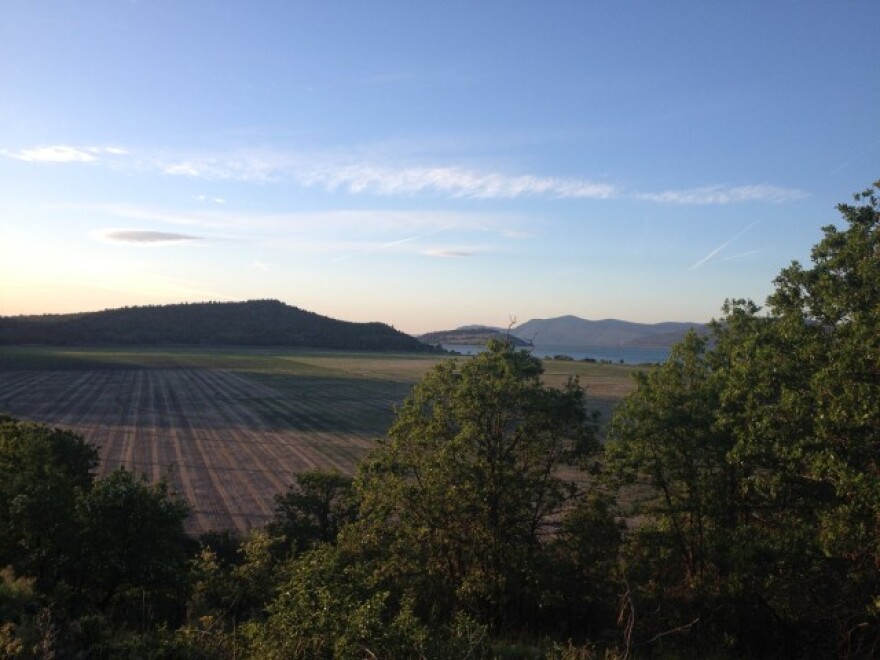People have been fighting about scarce water resources in the Klamath Basin in Southern Oregon and Northern California for decades. After nearly 10 years of negotiations, a series of agreements were reached. They were designed to provide irrigation certainty for farmers and ranchers while preserving river and fishery health. But Congressional approval for these locally-negotiated pacts is needed for them to move forward. And after years of delays, the Klamath Restoration Agreements are approaching an end-of-the-year deadline.
Joining KLCC's Desmond O'Boyle to talk about the latest developments is Jes Burns of from our EarthFix team..
Desmond: "Jes, we heard on KLCC Friday that Oregon Representative Greg Walden released draft legislation to deal with the Klamath Restoration agreements; can you remind us what that Walden’s proposal includes?"
Jes: "Representative Walden says his proposed bill will help solve long-standing water conflicts in the Klamath Basin. But the bill is pretty far from what tribes, farmers and others already negotiated as part of the Klamath restoration agreements.
Walden’s draft keeps in place the parts of the agreements that benefit agriculture and some other concerns, but it does not include dam-removal."
Desmond: "And that’s a big deal?"
Jes: "HUGE … he negotiated agreements include removal of four Klamath River dams. The tribes and fishermen insisted on that because of the harm the dams have caused to their fisheries. But this has really been a sticking point for Republicans in Congress, who have balked at the idea of dam removal anywhere. The thing is, not including dam removal is a deal breaker for the Indian tribes that negotiated the agreement. I heard this from the Klamath tribes and the Karuk – their spokesman is Craig Tucker.
Tucker: "That’s our bargained-for benefit. It’s like; the irrigators can’t stay at the table if there’s not water security. The power company can’t stay at the table if there’s not a limit on their liability…. Their primary bargained for benefit.”
Jes: "Tucker told me, 'If there’s no dam deal, then there’s no damn deal.'"
Desmond: "Anything else in there that could keep the agreements from going forward?"
Jes: "Yeah, Representative Walden also included a provision that kind of came out of nowhere – as far as some of the supporters of the agreements say. It would hand over about 100-thousand acres of federal forestland each to Klamath County in Oregon and to Siskyou County in California to be logged. Oregon’s Senators have already responded saying this would be a non-starter in the Senate, which would need to approve any legislation."
Desmond: "How big a factor is time in getting the Klamath issue settled?"
Jes: "It’s big. At the end of the year – the Klamath restoration agreements expire. At that point, the groups that signed on to the deals have to decide whether to extend this out another year – which happened last year - or walk away. It’s unclear what the groups will do, but it’s looking more and more likely that this thing will unravel if a suitable bill isn’t authorized by Congress this session. The Yurok tribe has already started the process of pulling out of the deal. Others may or may not join them.
Senator Ron Wyden does have legislation introduced on the Senate side that the supporters of the Klamath agreements are on board with. But whether Walden’s draft bill can be reconciled with that is the big question."
Desmond: "What about the dams?"
Jes: "This is actually a really interesting piece – without an agreement, the federal government restarts the process of relicensing the 4 dams on the Klamath River owned by the power company PacifiCorp. And before that can happen, Oregon and California have to give Clean Water Act approval. Oregon has been holding off, but California has been a little itchier - at the end of November, the state restarted its process. The relicensing could conceivably not go through, though that would be unprecedented. Alternatively, if PacifiCorp has to spend a bunch of money to upgrade the dams they might prefer to just remove them anyway. Remember, the utility already agreed to remove the dams if their costs were limited. And they’ve been collecting money from customers already to do this – every month on my electric bill; I pay a few bucks towards dam removal. So even without the Agreements, PacifiCorp says an independent dam removal settlement is still possible."
Desmond: "So what happens to everyone else if the agreements fall apart?"
Jes: "Well, for the irrigators in the Basin, it could be hard. The Klamath tribes have senior water rights and it is well within their right to cut off the water if there’s not enough flow to meet their needs. Will the groups down here be willing to go back to the negotiating table? That’s a monumental task. I mean, these agreements came out of ten years of painstaking negotiation. This has been really hard for everyone involved. And I’m not entirely certain folks have it in them to go through this all again."
Desmond: "Jes Burns is with our EarthFix team, she updated us on the latest developments on the Klamath Restoration Agreements."
copyright, 2015 KLCC


